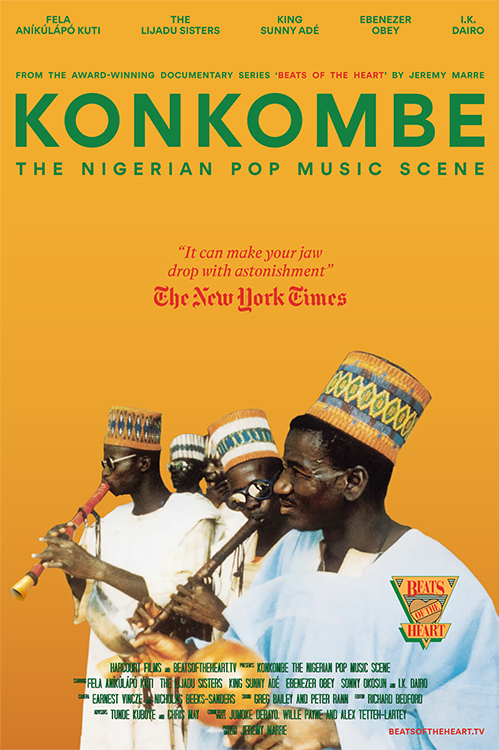
Konkombe: The Nigerian Pop Music Scene
Please select a showtime button above to buy tickets.
*Limited Walk-Up shows no longer have online tickets for sale. A limited number of tickets will be available at the box office 45 minutes before a show's start time, on a first-come first-served basis. Standby tickets will be available when Walk-Ups are sold out.
Director: Jeremy Marre Run Time: 51 min. Format: Digital Release Year: 1979
Starring: Benjamin “Kokoro” Aderounmu, Fela Aníkúlápó Kuti, I.K. Dairo, King Sunny Adé, The Lijadu Sisters
With DJ sets by musician Devendra Banhart, musician and producer Money Mark and an introduction from Nigerian cultural magazine The Native and special recorded greeting by Yeye Taiwo Lijadu
Doors open at 6:00pm
Screening in higher resolution than ever seen before, Konkombe: The Nigerian Pop Music Scene illustrates how native styles like juju, Afrobeat, and highlife all evolved in step with the country’s social, political, and spiritual currents, before the rest of the world caught wind. In a 1986 preview, The New York Times’ Jon Pareles wrote, “Somehow, the director Jeremy Marre manages to document musical events that most outsiders wouldn’t even hear about, much less be allowed to attend.” Fueled in large part by the month-long, globally-influential Festac ‘77 festival, Konkombe captures the outspoken yet overlooked The Lijadu Sisters at the center of the movement, alongside contemporaries like Benjamin “Kokoro” Aderounmu, King Sunny Adé, I.K. Dairo, and the Sisters’ second cousin Fela Aníkúlápó Kuti, before they moved to the US as political refugees.
While The Lijadu Sisters have recently called “fearless and groundbreaking leaders in the male-dominated Nigerian pop music scene” (Billboard) – praised and cited as inspiration by artists like Amaarae, Hayley Williams and so many others – it’s taken nearly six decades to finally start receiving the respect, protection and recognition they always deserved. Beginning this fall, an expansive new partnership with Numero Group brings justice to the musical and political impact of Yeye Taiwo Lijadu and the late Kehinde Lijadu, two iconic, identical twin sisters who “helped lay the foundation for African music’s global resonance today,” and “disrupted men’s dominion over it” (Rolling Stone).
Money Mark, is an American producer and musician, best known for his collaborations with the Beastie Boys, and his work with Guy Ritchie, Beck, Rolling Stones, Yoko Ono, and Iggy Pop, among many more. In 2013, he toured with The Lijadu Sisters and David Byrne, among others, when performing the music of William Onyeabor.
